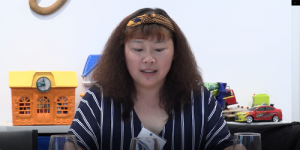
Have you ever noticed that when you hold a tiny flower in your hand and feel so much appreciation for its colour and form your heart is filled with joy? The same happens when we look at our child’s face during the day and when they are sleeping at night and our heart is filled with wonder and gratitude for them. As we hold that powerful positive attitude, we notice at these times our own feeling of joy increase. So, there is a very close connection between appreciation and feelings of joy.
The giving of appreciation both verbally and non-verbally can be a form of blessing or prayer. Our thoughts are very powerful, as are our spoken words. When we think of our child or adolescent during the day we can ‘send’ them thoughts of positivity, love, and gratitude, or negativity, worry and anxiety. The same applies to how we talk to them. When our child or adolescent receives words of kindness, appreciation and encouragement from us they thrive, and gain greater self-confidence and self-worth.
Negative comments such as criticism tend to have the opposite effect, even when we are only just trying to encourage them to do better. Angry, harsh and hurting words tend to have a negative effect, not just in that moment in time, but on the parent-child/adolescent relationship. As every parent knows, life is not perfect, nor are our children, nor are we. There will be times when we say something that we regret. At these times what we do immediately afterwards is most important. For instance, a sincere apology, especially for the manner in which we said it, or even the actual words we said, is very helpful. An example of this could be “Honey I’m sorry I spoke to you like that; you didn’t deserve for me to talk to you in that way”. This apology will hopefully restore the loving heart connection, at that moment in time, between our child or adolescent and ourselves. Especially if it is not said by blaming the child, e.g. “I’m sorry, but if you behaved yourself, I wouldn’t have needed to say anything.”
Negative thoughts tend to work in a similar way. When we think or ‘send’ our child/adolescent, non-verbal thoughts of anger or other negative thoughts, such as she or he is so annoying, a pain, or such a burden to us, not only can our attitude be picked up by them, but also it is at these times we notice we feel sadness, distress, frustration and maybe anxiety and loss of hope that their behaviour will ever change. So negative thoughts can affect both them and us.
One of the greatest parenting tools that we all have is the positivity we hold in our hearts and also say to our children/adolescents.
So, if we are not naturally appreciative parents how do we become one? I believe practice is the key. By this, I mean daily practice as much as possible each and every day.
We may like to begin with everything around us such as the house or apartment where we live. I have made it a daily ritual of being in the present and looking around me and noticing even small things such as something that reminds me of a loved one, my warm and comfortable bed, the clothes I wear, a big pot that is so useful to cook dinner in, or the food I have in the fridge. Around us all the time are many things, even the clean air we breathe, for which we can actively think thoughts of appreciation.
Or we may like to begin by focusing on our child or adolescent, even at times when they are away at school or some other place, and train ourselves to think as many positive thoughts about them as we can think at the time. One mum whom I was working with over the last year, shared how anxious and depressed she felt every day because her young child was staying with a grandparent and she was not able to visit her or have her back because of circumstances. She said she thought about the situation and her little girl every day which made her extremely sad. After learning in the parenting course about the power of thoughts and blessings she changed each tearful moment into ‘sending’ her daughter her love, and things soon began to change. Shortly after she completed the course, she sent me photos of her and her daughter playing at a park. She believed it all began by the power of her sending her love daily to her little girl.
For us as parents, this is a very powerful way of connecting positively with our children. Verbally expressing appreciation and also ‘sending’ it from our heart to their heart by karakia, is a wonderful way to enhance their positive wellbeing. It is also a wonderful tool or strategy for creating strong and loving family relationships.



